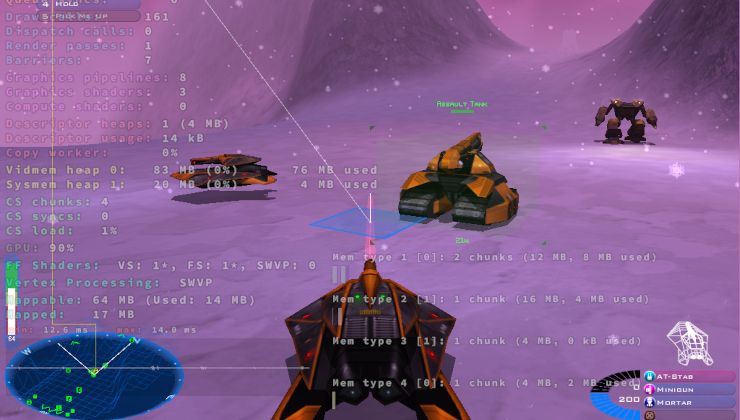The popular Linux gaming image Bazzite has a July 2025 update out with some interesting new features and expanded device support.
For new devices the ASUS ROG Z13 2025 is now fully supported along with the ONEXPLAYER X1 Mini Pro too. There's also a Linux kernel version bump to 6.15.4, with a few of their own fixes added in for hardware support.
One addition that sounds quite interesting is the new WiFi service IWD (iNet Wireless Daemon) from Intel, which can solve various issues they listed including:
- Periodic WIFI scanning causing latency jumps/freezes while streaming games (e.g., Sunshine).
- Slower WIFI compared to Windows on mesh networks.
- Network dropouts in busy areas or under dense mesh networks.
It's not enabled by default though.
A big change for Bazzite's Desktop Mode is the new app store named Bazaar. It has a pure focus on Flatpak, so it's a good fit for projects like Bazzite. They said it allows them to directly curate recommendations too, it has better performance than other app stores and they've tweaked it to remove certain Flatpaks like Steam that would cause problems.
See more in the Bazzite post.
I definitely need to personally get Bazzite installed on something soon. I've been planning to build a living room SteamOS box for a while, I just need to push myself to actually do it.
Last edited by Stella on 8 Jul 2025 at 10:23 am UTC
Other than that, it really feels like a great distro for most people unless you want to really dig deep into configurations. Then the immutability will be a huge issue. But for most users? Works well. I was even able to setup up some coding stuff on it without issues.
I was lucky to aquire the XG Mobile 6850M XT (2022) for the Ally and it works also on Linux (I still boot into Windows to enable it via Armory Crate though), and I'd like to get VR running there too. So far I wasn't able to get VR running in desktop mode, but I haven't tinkered enough with it yet. On Windows Mini-Corben was enjoying VR via Steam Link and his Quest 3S already a lot.
I thought about installing Chimera OS first, yet Bazzite seems to have taken the lead on PC gaming handhelds?
The only issue with installing Bazzite I had was shrinking the Windows partition :wink: (so it's not a Bazzite issue). Eventually with using the free and foss version of UltraDefrag I was able to move those unmovable files.
Otherwise the installer went smooth (needs a keyboard/mouse attached though), it just took the free space and did its thing.
Bazzite is running really great on the ROG Ally and Legion Go, and the HandHeld Deamon tool works splendid to limit battery charge to 80%, configure the RGB lights and boot back into Windows (for whatever reason).
Last edited by Corben on 8 Jul 2025 at 1:40 pm UTC
Part of me wonders if I should rebase to Aurora, or return to Kubuntu. The former means I'd have to rely on the Steam Flatpak, and the latter means I'd have to yet again go through the motions of removing Snap (and I have to do this every OS update).
For better or worse, it looks like I'm stuck with Bazzite on my desktop.
Last edited by CyborgZeta on 8 Jul 2025 at 3:33 pm UTC
As someone who lives in Europe, and who takes data privacy seriously. I have moved away from any application that is US centric. I've had to do this to ensure my data security and also to ensure that GDPR is actually enforceable. I moved to Linux to get away from all the Windows/MacOS Spyware and ensured all my security applications are EU based. At the moment I'm using CachyOS which is based in Germany and uses Arch - based in Canada. This way I can be sure to maximise my security and ensure that my data is not held any place within the USA. Fedora/Red Hat/Ubuntu are all really rather suspect, as once something stops being really FOSS, then there is an instant conflict of interest.
That all said, I trialed Bazzite and really loved its smoothness and easy of working (although the install was a little troublesome). Had it been a EU based distribution, I may have stuck with it, but then the fact it is Fedora based would always represent an issue.
Sorry, couldn't help myself given that bit of trivia :)
While the EU is absolutely better for privacy/security than the US (America is probably the worst place for that, it was never really a contest), that doesn't make the EU saints or that they don't have intentions undermine their own citizen's privacy/security; see the EU plan to kill encryption, CSAM, and their future plan to ban Monero (private, digital cash) etc. If I were to summarize the EU's stance on privacy rights, I'd say their actions are that they don't want no company to have unrestricted access to user data, but they do want that data for themselves (the governments).
What truly ensures one's security and their right to privacy here is using the right open source tools. Nationality or HQ location is a concern for sure, but what's a bigger concern is using closed-source tools or even FOSS tools that aren't properly audited. Yes, this is the zero-trust strategy, since the idea of "trust me bro" or "it's fine, covert data collection is illegal here" are not at all enough to give one a real sense of what we're discussing here, only a promise.
This is why I don't mind the fact that, for example, the Signal private messenger is based in America, because any 3 letter agencies in the whole world can be my guest and spend all day long trying to decrypt that quantam-resistant cryptography of the Signal Protocol, and they won't succeed. This level of assurance is achieved thanks to the fact Signal is open source.
Coming back to Fedora/Bazzite being based in the US, this is one example of changing districts not doing anything to one's privacy, as Fedora already doesn't collect information on users by default, the code is open source so we don't have to take their word for it, we verify that ourseleves. What does hurt Fedora being in the US are other topics that are real show-stoppers (their paranoia of not pre-installing essential non-FOSS packages due to fear of the copyright police), but nothing that relates to privacy or security.
Ultimately our position is we ship what works, I am blind to application frameworks.
@such If you meant me, I do not live on a boat. Though that also is entirely meaningless regarding this users perceived privacy.
I do like Bazzite a lot, and it's been working very well. Despite my earlier comment, I really don't have any intention of moving away from Bazzite because of the presence of GNOME/GTK software.
So, I apologize if my earlier comment came across as rude or disrespectful. Thank you for the work you guys have done, and are doing.
akonadi akonadi-calendar ckb-next kcalutils kdepim-addons kdepim-runtime kimap korganizer merkuro partclone qt6-qtlocationckb-next is a project to easily make a lot of Corsair RGB keyboard adjustments, and has much better UX than OpenRGB in my opinion, while akonadi, kdepim, merkuro etc are to get events integrated in the calendar applet, because the Flatpak version of Kontact can't do it. I think a lot of people like me expect to be able to have their Google Calendar or Nextcloud events show up in the system's calendar.
Otherwise, I am not quite sure how often and when the distro updates. There's the System Update utility where I can easily check for new updates for everything, but updates feel quite opaque; I think by default they are set up to run automatically, but when? And can I turn them off or at least adjust frequency? In the JayzTwoCents video recently where they tried Bazzite they showed KDE Plasma's software update frequency setting, but I don't think it actually does anything in Bazzite's case, so even though out of the box it says "Update software: Manually", I think Bazzite's update script just does it all in the background automatically. Not great UX either, in other words.
Anyway, those are my caveats about Bazzite. Feel free to correct me if I'm wrong about any of this.
Otherwise it's a really cool distribution and actually made me like atomic distributions. Except the download size of 1gb every day.
Though, I really switched to the cosmic main image to make sure I am not running the risk of actually having a too stable system. Didn't work, it's still stable and does not give me many problems.










 How to setup OpenMW for modern Morrowind on Linux / SteamOS and Steam Deck
How to setup OpenMW for modern Morrowind on Linux / SteamOS and Steam Deck How to install Hollow Knight: Silksong mods on Linux, SteamOS and Steam Deck
How to install Hollow Knight: Silksong mods on Linux, SteamOS and Steam Deck